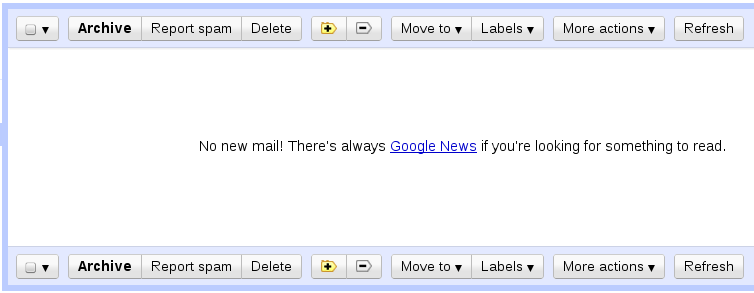|
Last updated October, 2017. note: we link to our free guide to mindfulness and meditation at the bottom of the page (no email required). Look at your email Inbox - what's it like? Are you the person who strives to keep it empty? When an email comes in, do you immediately decide what to do with it: take action, delegate, file, or delete? Or, are you like the other 99.9% of us who have a cluttered Inbox? I have an email dating back to February of last year in my Inbox. It's there because I was supposed to do something with it. Once a month I open it and remember what I was supposed to do. This has been going on for almost a year now, but there it sits...mocking me. Can you relate? Now, compare your mind to your email Inbox. And, thoughts to emails. When a new thought pops up, what do you do with it? Does it just sit there, cluttering up your mind? Do you try to ignore it, but get annoyed when you catch a glimpse of it? Or, do you purposefully keep it around "just in case?" Our minds tend to be much worse than our Inboxes. They are full of thoughts - what do you do with them? If you like them (i.e., you label them "good" or "positive"), you might try to keep them around; this is akin to forced positive thinking. If you don't like them (i.e., you label them "bad" or "negative"), you might try to suppress or repress them; this is never a healthy option. But, for all of the thoughts you know about, there are a lot more you don't know about. Your mind doesn't have an "off-switch" - it's constantly producing thoughts, and you're not even aware of most of them. You're not alone, though - if it's any consolation, this is the case for all of us (whether we realize it or not). As Eckhart Tolle often points out: "The human condition is lost in thought. " Regardless of your level of awareness, all of these thoughts are there. They give rise emotions, which lead to more thoughts and more emotions, which culminates in conditioned behavior (decisions, actions, reactions). And, this process determines your state of being. Returning to the analogy: If your mind is like a cluttered Inbox, you are most likely in a perpetual state of stress. You probably find yourself overwhelmed much of the time. You might suffer from feelings of anxiety or depression, as well as issues with sleep, focus, productivity, and so on. If, on the other hand, your mind is not like a cluttered Inbox, you are most likely in a more content state much of the time. You might find you are creative and focused, which results in greater productivity. And you probably don't lay awake at night, dwelling on thoughts of everything that has gone wrong (or, could go wrong) in your life. The question is, how do you "un-clutter" your mind? Especially if you don't even know about most of what's there? It's a bit of a trick question, because you don't actually un-clutter it. Instead, you learn to move your attention away from it and let it be as it is. You do this by strengthening awareness of your mind and its non-stop activity. You develop the skill of noticing it all without getting caught up in it. This is the essence of meditating. If you develop a consistent practice and bring mindfulness to your daily life, you will distance yourself from the mental clutter of the 50,000+ thoughts you are exposed to every day. Instead of continually being caught up in all of it - instead of being dragged around by all of it - you use what you need, and move your attention away from the rest. As a result, your life (unlike your Inbox) will be less chaotic. Now I need to figure out what to do with that email from last February. Stop dealing with the symptoms.Stress, anxiety, self-confidence issues, the inability to stop bad habits, problems with sleep and focus, and on and on and on.
These and the other things we struggle with every day are only symptoms. The good news is, they all share the same root cause. The bad news is, if you don't address that root cause, the symptoms will keep coming back no matter what you do. That's why we wrote "An owner's guide to the mind." For almost 20 years, people have been using it to address the root cause of their daily struggles. Click here to view the contents and learn more. Comments are closed.
|
